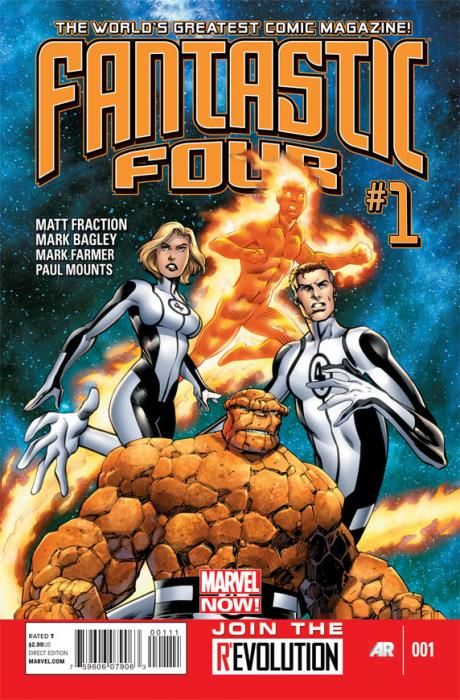The original "Fantastic Four" #1 was a landmark moment for Marvel, containing the beginnings of the Marvel Universe and marking the inception of a new kind of comic. Clearly, it'd be unfair to expect the same level of importance from the latest comic to call itself "Fantastic Four #1", but the title does herald a new beginning for Marvel's first family with the arrival of a fresh creative team: Matt Fraction and Mark Bagley.
As with other Marvel NOW! titles, Fantastic Four's first issue seems to defy its numbering, reading more like a jumping-on point than a clear break with the past. There are numerous references to the series' recent pedigree, whether that's the peripheral appearance of Future Foundation members or the re-use of Johnny's ship, "The Pestilence." The overall story is a new one that doesn't directly build on previous writer Jonathan Hickman's work, but the vestigial remains of Hickman's work are there, cluttering the place up like toys that haven't been properly tidied away.
While "Fantastic Four" #1 lacks the high-speed drama, genre-busting ideas and vivid characterisation of Fraction's "Hawkeye", it's also free of the incoherence that marred some of the writer's other Marvel work. The core cast is recognizable and gently familiar, while the concepts are big but relatable. It's technically competent and easy to read.
However, technically competent isn't something people get worked up about and it doesn't get people talking. Mark Bagley, unquestionably the most consistent storytelling artist of the past 20 years, is practically the definition of technically competent. His visuals service the story, but never try to eclipse it. His panels are clean and structured. He is, without a doubt, an artist you can depend on to provide a better-than average looking book, and to get the writer's intentions over. But where's the chemistry? Where's the magic that we saw him generate in his "Ultimate Spider-Man" work?
Where the book truly fails to get any traction is in finding a moment that might snap readers to attention. It's all so -- expected. It feels like "Fantastic Four" imagined in its most basic incarnation, which is notionally a good starting point, but it seems unlikely to convince those drawn in by Marvel NOW! to stay. If you didn't like "Fantastic Four" before, this comic gives you no reason to think you'll like it now.
Perhaps that's a good thing after the structured, gargantuan ideas of Hickman's run. Perhaps there is still a big twist coming that'll deliver something unexpected. But it's not in this issue. "Fantastic Four" #1 appears to be a deliberate attempt to go back to basics. It's not bad, but nor is it the punch in the face the book really needed to shake it out of its perpetual complacency -- and if Matt Fraction can't deliver that, who can?

